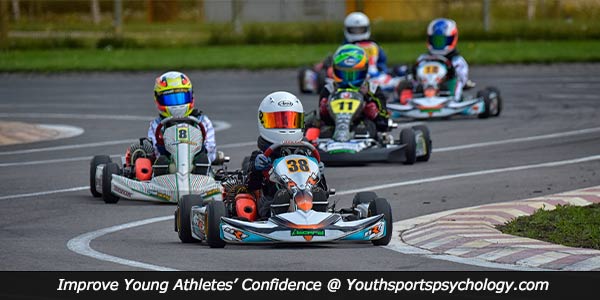Help Young Athletes Build Trust and Confidence
Trust and confidence are very important for young athletes’ success in sports and are interrelated.
If athletes lack confidence, they don’t believe in their ability to perform under pressure. If they don’t trust their skills, they lack confidence heading into competitions.
Let’s take a look at confidence and trust, both mental game skills.
When your athletes feel confident, they believe they have the physical and mental traits needed to perform a skill. They believe they can develop skills through training and practice. And they have faith in their ability to perform a skill in competition, in spite of the pressure.
When athletes trust in their abilities, they know they have practiced enough–doing physical repetitions, for example–to just go for it and rely on muscle memory when they’re playing. Trust allows kids to simplify their game during competition. When they trust in themselves, they can be decisive and play athletically. They stay in the moment and don’t think about the outcome.
Confidence and trust influence each other. Kids build trust through repetition and practice. They build confidence by being prepared and recognizing their successes, improvements and positive qualities.
When athletes lack trust or confidence, they under-perform and are hesitant during competition.
Ben Simmons Has Confidence and Trust in His Shot
Here’s an example: Point guard Ben Simmons, a four-year veteran of the Philadelphia 76ers, is known for his aggressive defense and passing, but he’s also known for being hesitant about taking outside jump shots, especially from the three-point range.
In his first three seasons, Simmons only attempted three shots from the three-point line, going 1-for-3. In the first few games of the 2020-21 season, Simmons has attempted two three-pointers and made both.
Why has he improved? Simmons has been practicing and working on his three-point shot before games and in practices, developing both confidence and trust in his shot. It is clear that Simmons’ work has paid off.
Simmons described one of his three-pointers this season against the Orlando Magic. Simmons just released the ball with no conscious thought or worry about the outcome, he said.
“I came down [ the court]… Joel (Embiid) threw to me in the corner, and I let that go. Joel threw the pass, he knew I was gonna put it up. It was a shot that I work on, corner threes. I feel comfortable taking it so I knocked it down.”
Teammate Seth Curry said he’s confident in Simmons’ ability to make three-pointers.
“I’ve seen him make it in practice, and I know he can knock it down. Especially from the corner, so it’s just a matter of him doing it in a game and stepping into it with confidence. It didn’t look like there was too much hesitation on the shot, and I expected it to go in, to be honest.”
When, like Simmons, young athletes work on their physical skills, without self-judgment or harsh criticism, they build the needed trust and confidence to perform at their peak under the pressure of competition.
Parents Can Help Sports Kids Develop Trust and Confidence
Parents can help kids build trust and confidence by encouraging them to practice, prepare, test their skills and repeat the process.
To help build trust and confidence, young athletes should visualize themselves performing skills successfully in competition. When they visualize, they imprint those images in their mind, which helps them during competition.
Sports kids should mentally rehearse playing freely and athletically during their warm-up routines. Then they should get into the mindset that practice is behind them; it’s time to just compete.
Improving trust and confidence is critical to performance and success in sports. Parents should help kids understand these benefits, and help their kids work on building these all-important skills.
Related Articles on Kids’ Mental Game:
- 5 Pregame Mental Skills For Young Athletes
- Can Athletes 5-10 Years Old Learn Mental Skills for Success?
- The Role of Mental Game Skills for Sports Kids
*Subscribe to The Sports Psychology Podcast on iTunes
*Subscribe to The Sports Psychology Podcast on Spotify
Improve Your Mental Game From Anywhere In The World

We’re certain that, as a parent, you want to help your child develop confidence and discipline in sports and life. And as a sports parent, you’d love for your children to reach their potential in sports. But encouraging your child to strive for greatness without pressuring them can be a challenge.
You can get expert mental coaching with us from anywhere. Meet with us via Zoom, Skype, FaceTime or phone call. With today’s video technology, we are able to connect with athletes and coaches all over the globe.
Call Us Today to Schedule Your Free 15-Minute Session.
Find Out How Your Athlete Can Benefit From One-on-One Mental Coaching!

